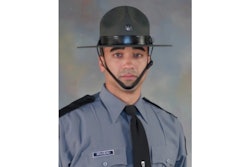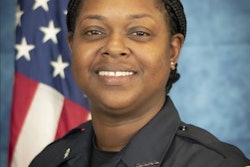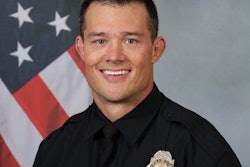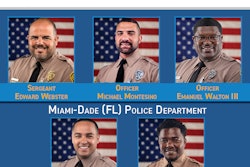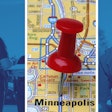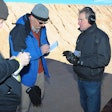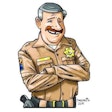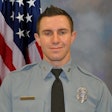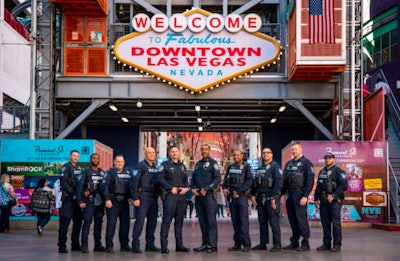 Members of the Flex Team are shown at Freemont Street, one of three primary tourist areas within the city.City of Las Vegas
Members of the Flex Team are shown at Freemont Street, one of three primary tourist areas within the city.City of Las Vegas
The City of Las Vegas has increased its efforts to target crime in tourist corridors and improve people’s perceptions. First, a special operation was rolled out last fall, then the city launched its Flex Team comprised of deputy marshals earlier this year.
The City of Las Vegas is just a fraction of the larger area people consider Vegas. While Las Vegas Metropolitan Police Department is tasked with responding to calls across the broader area and within the city, the City of Las Vegas Department of Public Safety provides the public with additional law enforcement and detention services within the city limits.
The department has about 100 deputy marshals that focus on the parks, about 60 miles of trails, and tourist corridors.
While having 100 sworn officers may make the department seem small to some, the marshals are trying to have a big impact on criminal activity and the perception of crime in tourist areas.
Background
In 1973, the cities in Clark County turned over law enforcement duties to the sheriff’s department, which operates the Las Vegas Metropolitan Police Department. An elected sheriff runs both the sheriff’s department and the police department.
To understand the role of the City of Las Vegas Deputy Marshal Unit, one must understand how it evolved. Key milestones along that path include:
- 1982 — The City of Las Vegas Department of Detention and Correctional Services started.
- 1982 — The city council approved the concept of starting the City of Las Vegas Park Ranger Unit.
- 1986 — The Park Ranger Unit was transferred to the City of Las Vegas Department of Detention and Corrections.
- 1992 — The Park Ranger Unit became the Deputy City Marshal Unit
Marshals’ Duties
The deputy marshals are Category 1 police officers that patrol more than 80 parks, and more than 100 city facilities, explains Chief Jason Potts, director of the City of Las Vegas Department of Public Safety. They also have jurisdiction over the roadways and all public areas, including the three primary tourist corridors located within the city. They do not have jurisdiction over private property, so in the case of a call for service in a private home, that would be handled by LVMPD.
Targeting Tourism Areas
The marshals launched a Flex Team earlier this year, in a similar fashion to a team by the same name that LVMPD has had for a while, explains Potts. He points to Freemont Street as an example and said he has heard that people think of it as “grimy” and “dangerous.” The other key tourist areas within the city are Las Vegas Boulevard near the Stratosphere and the Arts District.
“We’re trying to improve those perceptions of the safety out there,” he said. “What we are trying to chase in policing is less victims and preventing the next crime. We have to interrupt and disrupt the criminal element on one hand and engage with the community on the other, and the two are not mutually exclusive.”
He explains how working like this helps prevent little crimes from turning into big ones. Dealing with any disorder will dispel the idea that “folks can come in here and do whatever they want without any sanctions.”
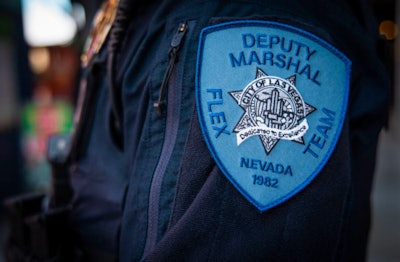 A Flex Team patch denotes deputy marshals that are part of the team when they are in uniform.City of Las Vegas
A Flex Team patch denotes deputy marshals that are part of the team when they are in uniform.City of Las Vegas
Flex Team
The Flex Team, launched in January, is a problem-oriented team that is precision based and can narrowly target problems. Potts uses the analogy of fishing with a spear, rather than casting a net.
“We’re much more data driven. So, we want to go where the hot persons are, at the hot times, and the hot locations, and just figure out where our crime analysts are saying the crime is occurring,” Potts explains.
The Flex team found success in its first three months – 558 calls for service, more than 50 arrests, and more than 110 citations.
Although visibility can be important, often the Flex marshals are in plain clothes and working in a lower-profile capacity to locate and suppress criminal activity.
“Our Flex team is used in plain-clothes investigations. They're using undercover surveillance; they're getting on top of higher elevations to look down on Fremont Street. They're doing everything they can to really focus on those hot people,” said Potts. “They're very hybrid.”
This tactic lets the marshals also combat juvenile crime Potts says, as he points out there have been several juvenile-related shootings in the Freemont Street area.
The Flex marshals were all handpicked, Potts says, based on their emotional intelligence, problem solving abilities, and capabilities to be team players.
“That's what we want. Good, smart problem-solving cops,” he says.
Flexibility, as the team’s name applies, comes in many facets — criminals cannot pattern when the marshals are working, or not.
“To keep them guessing, we make sure we are flexible,” he says.
The Flex marshals try to keep an eye out for juveniles that prey on tourists, street panhandlers that get aggressive, people who partake of too much alcohol, and even dangerous driving near the tourist areas. They have even aprehended a murder suspect and caught some serial copper thieves.
“We're just really just trying to leverage technology. So, we are leveraging some of our security cameras. We have some plans in place to look at license plate readers. We’re using all kinds of different methods, undercover surveillance, plainclothes surveillance, using informants, you name it, they're a specialized team that's really focused on impacting crime.”
Operation SAFER
Prior to the formation of the FLEX Team, last November the department rolled out Operation SAFER, in which Safer stands for Stronger Alliance for Enforcement Relationships.
Like FLEX, it targets tourist corridors and focuses largely on building relationships within those areas. The impact, when measured, showed a 25% reduction in calls to LVMPD, Potts explains.
“We know that our economic engine is our tourist corridor. We're being much more intentional in those areas. They're just really engaging, really getting out there talking to people and talking to business owners,” Potts says.
“If you went down Las Vegas Boulevard right now and did a windshield survey, you'd see that from the Sahara all the way north, it would be markedly different than when it was six months ago. And that's just us getting after it,” he explained.
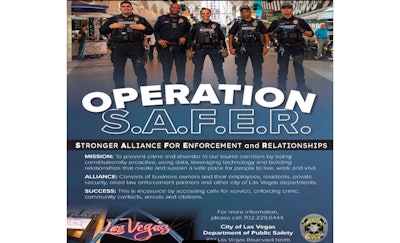 Operation SAFER engages the community.City of Las Vegas
Operation SAFER engages the community.City of Las Vegas






